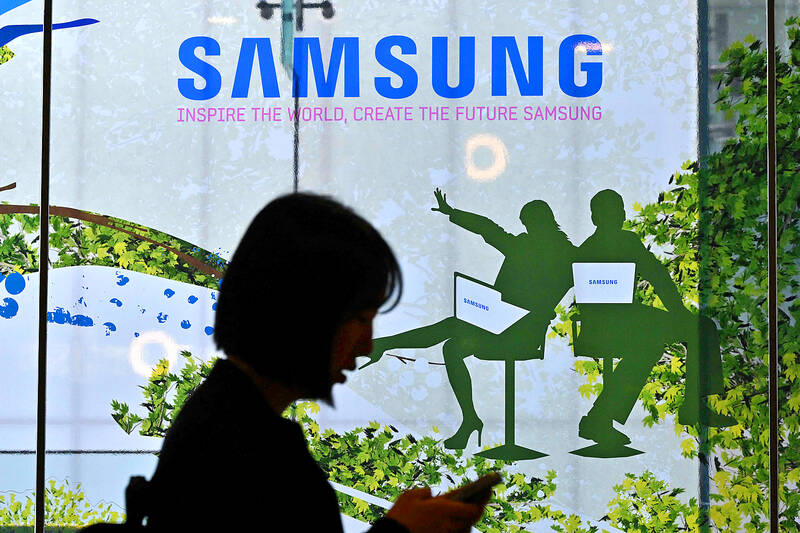The new head of Samsung Electronics Co’s semiconductor division urged employees to work their way past challenges in the business, making his first remarks to staff after the surprise departure of his predecessor last week.
Jun Young-hyun — a memory chip veteran who is returning to the company after leading Samsung SDI Co — unexpectedly replaced Kyung Kye-hyun as the new leader of its most important business line on Tuesday last week.
“I am confident that we can overcome the recent difficulties as quickly as possible if we continue to build on the strengths we have accumulated so far and continue the culture of communication and discussion that is unique to semiconductors,” Jun said on an internal site seen by Bloomberg News.

Photo: Jung Yeon-je, AFP
Jun would be facing a series of challenges. Its semiconductor division lost about 15 trillion won (US$10.9 billion) last year. The company has fallen behind rival SK Hynix Inc in high-bandwidth memory chips, which have seen explosive growth, as they are used for training artificial intelligence (AI) models like ChatGPT. The firm is also facing the first-ever strike in its 55-year history.
“Especially now, in the age of AI, we are facing a future that we have never experienced before,” he said. “This poses a great challenge to us, but if we respond with the right direction, it can be a new opportunity for the semiconductor business, which is essential in the AI era.”
Investors have become increasingly concerned about Samsung’s response to SK Hynix, which reported its fastest pace of revenue growth since 2010. That has propelled about 40 percent rally in SK Hynix shares since the start of this year, compared with a slump of about 5 percent for Samsung’s.
In other news, India would have to attract a wider range of semiconductor suppliers to succeed in building a robust domestic chip industry, trade group SEMI president and CEO Ajit Manocha said.
“They need to really increase the emphasis on the ecosystem because, without an ecosystem, growth will be limited,” Manocha said on the sidelines of the India-Taiwan Semiconductor Forum in Taipei on Thursday. “They need to encourage smaller and medium-sized companies to come and set up shop in India.”
Indian Prime Minister Narendra Modi has set up a US$10 billion fund to help attract global chipmakers such as Taiwan Semiconductor Manufacturing Co (台積電).
Manocha said that if Modi wins a third term, the country is very likely to expand the program beyond US$10 billion to help create a comprehensive ecosystem.
However, no major semiconductor firms have committed to significant investments in India so far, partly due to challenges with infrastructure, including a stable power supply.
The two most high-profile projects are a US$11 billion site by the Tata Group in partnership with Powerchip Semiconductor Manufacturing Corp (力積電) to make mature chips, and a US$2.75 billion assembly and testing facility by Micron Technology Inc.
India is on the right track, Manocha said, adding that the Tata and Micron projects can act as catalysts for the country’s plans to build a technology foundation in the country.

SEMICONDUCTORS: The German laser and plasma generator company will expand its local services as its specialized offerings support Taiwan’s semiconductor industries Trumpf SE + Co KG, a global leader in supplying laser technology and plasma generators used in chip production, is expanding its investments in Taiwan in an effort to deeply integrate into the global semiconductor supply chain in the pursuit of growth. The company, headquartered in Ditzingen, Germany, has invested significantly in a newly inaugurated regional technical center for plasma generators in Taoyuan, its latest expansion in Taiwan after being engaged in various industries for more than 25 years. The center, the first of its kind Trumpf built outside Germany, aims to serve customers from Taiwan, Japan, Southeast Asia and South Korea,

POWERING UP: PSUs for AI servers made up about 50% of Delta’s total server PSU revenue during the first three quarters of last year, the company said Power supply and electronic components maker Delta Electronics Inc (台達電) reported record-high revenue of NT$161.61 billion (US$5.11 billion) for last quarter and said it remains positive about this quarter. Last quarter’s figure was up 7.6 percent from the previous quarter and 41.51 percent higher than a year earlier, and largely in line with Yuanta Securities Investment Consulting Co’s (元大投顧) forecast of NT$160 billion. Delta’s annual revenue last year rose 31.76 percent year-on-year to NT$554.89 billion, also a record high for the company. Its strong performance reflected continued demand for high-performance power solutions and advanced liquid-cooling products used in artificial intelligence (AI) data centers,

Gasoline and diesel prices at domestic fuel stations are to fall NT$0.2 per liter this week, down for a second consecutive week, CPC Corp, Taiwan (台灣中油) and Formosa Petrochemical Corp (台塑石化) announced yesterday. Effective today, gasoline prices at CPC and Formosa stations are to drop to NT$26.4, NT$27.9 and NT$29.9 per liter for 92, 95 and 98-octane unleaded gasoline respectively, the companies said in separate statements. The price of premium diesel is to fall to NT$24.8 per liter at CPC stations and NT$24.6 at Formosa pumps, they said. The price adjustments came even as international crude oil prices rose last week, as traders

SIZE MATTERS: TSMC started phasing out 8-inch wafer production last year, while Samsung is more aggressively retiring 8-inch capacity, TrendForce said Chipmakers are expected to raise prices of 8-inch wafers by up to 20 percent this year on concern over supply constraints as major contract chipmakers Taiwan Semiconductor Manufacturing Co (TSMC, 台積電) and Samsung Electronics Co gradually retire less advanced wafer capacity, TrendForce Corp (集邦科技) said yesterday. It is the first significant across-the-board price hike since a global semiconductor correction in 2023, the Taipei-based market researcher said in a report. Global 8-inch wafer capacity slid 0.3 percent year-on-year last year, although 8-inch wafer prices still hovered at relatively stable levels throughout the year, TrendForce said. The downward trend is expected to continue this year,